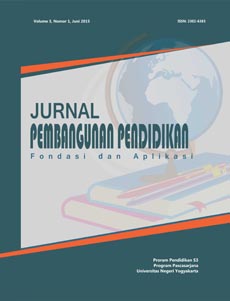MEMBENTUK GURU YANG BERMORAL, HUMANIS DAN PROFESIONAL MELALUI PROSES PSIKO-PEDAGOGIS
DOI:
https://doi.org/10.21831/jppfa.v4i2.12426Abstract
Kata kunci: membentuk guru, psikopedagogis
BUILDING THE TEACHER MORAL, HUMANIST AND PROFESSIONAL THROUGH PSYCHO-PEDAGOGICAL
AbstractThe desire to realize the teacher's character had long desired. Each period and institutions formulate in diverse terminology. Nowadays Yogyakarta State University want to produce teacher candidates who characterized moral, humane, and professional. In order to produce the prospective teachers it should be understood the characteristics of the teachers that will be set up and how to handle it first. The tasks of teachers is not just delivering course material to students. Teachers have a much more noble tasks to develop the spiritual aspects of the student so that they were to be humans noble character. In order to achieve this goal the implementation of learning in college should also considers the development of psycho-paedagogis aspects. Optimizing the spiritual aspects of the student can be done by referring to the ability (psychic) of human beings as proposed by Bandura, it all further developed through the process of education (paedagogical). Each type of character developed by integrated in lecture material and implemented continually. In addition, the entire community of college may give an example, and particularly the lecturers themselves should set the example for the students in the daily execution of their duties. It is one of perspective tasks that must be implemented by each lecturer in shaping future teachers that characterized by moral, humane, and professional.
Keywords: shaping teacher, psycho-paedagogisDownloads
Published
How to Cite
Issue
Section
Citation Check
License
The Authors submitting a manuscript do so on the understanding that if accepted for publication, copyright publishing of the article shall be assigned to Jurnal Pembangunan Pendidikan: Fondasi dan Aplikasi
 | Jurnal Pembangunan Pendidikan: Fondasi dan Aplikasi by https://journal.uny.ac.id/index.php/jppfa is licensed under a Creative Commons Attribution-ShareAlike 4.0 International License. |












